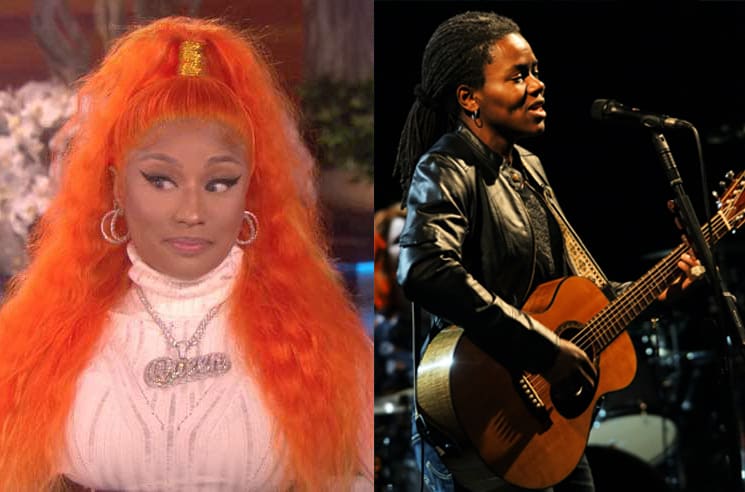Tracy Chapman has emerged victorious in her copyright battle with Nicki Minaj.
According to documents filed in California Federal Court earlier this week, Chapman has been awarded $450,000 USD, Pitchfork reports. This includes all costs and attorney fees associated to the long-running case.
As previously reported, the dispute dates back to 2018 and centres on Minaj's Nas-assisted track "Sorry," which was said to steal major elements from Chapman's 1988 song "Baby Can I Hold You." The offending track was an unreleased but leaked song from Minaj's Queen album.
Following news of the judgment, a rep for Minaj told Pitchfork, "We settled for one reason only. It would have cost us more to go to trial."
Minaj had previously denied that "Sorry" infringed on Chapman.
Chapman had claimed in the lawsuit that Minaj's song "incorporates the lyrics and vocal melody of ['Baby Can I Hold You'], its most recognizable and memorable parts."
The suit added that Minaj used "these parts of ['Baby Can I Hold You'] without first seeking the authorization to do so," also claiming that the interpolation of "lyrics and vocal melody comprise approximately half of ['Sorry'], and are easily recognizable and identifiable as Chapman's."
A rep for Chapman, meanwhile, offered the following statement to Pitchfork about the judgement:
I am glad to have this matter resolved and grateful for this legal outcome which affirms that artists' rights are protected by law and should be respected by other artists. I was asked in this situation numerous times for permission to use my song; in each instance, politely and in a timely manner, I unequivocally said no. Apparently Ms. Minaj chose not to hear and used my composition despite my clear and express intentions. As a songwriter and an independent publisher, I have been known to be protective of my work. I have never authorized the use of my songs for samples or requested a sample. This lawsuit was a last resort—pursued in an effort to defend myself and my work and to seek protection for the creative enterprise and expression of songwriters and independent publishers like myself.
According to documents filed in California Federal Court earlier this week, Chapman has been awarded $450,000 USD, Pitchfork reports. This includes all costs and attorney fees associated to the long-running case.
As previously reported, the dispute dates back to 2018 and centres on Minaj's Nas-assisted track "Sorry," which was said to steal major elements from Chapman's 1988 song "Baby Can I Hold You." The offending track was an unreleased but leaked song from Minaj's Queen album.
Following news of the judgment, a rep for Minaj told Pitchfork, "We settled for one reason only. It would have cost us more to go to trial."
Minaj had previously denied that "Sorry" infringed on Chapman.
Chapman had claimed in the lawsuit that Minaj's song "incorporates the lyrics and vocal melody of ['Baby Can I Hold You'], its most recognizable and memorable parts."
The suit added that Minaj used "these parts of ['Baby Can I Hold You'] without first seeking the authorization to do so," also claiming that the interpolation of "lyrics and vocal melody comprise approximately half of ['Sorry'], and are easily recognizable and identifiable as Chapman's."
A rep for Chapman, meanwhile, offered the following statement to Pitchfork about the judgement:
I am glad to have this matter resolved and grateful for this legal outcome which affirms that artists' rights are protected by law and should be respected by other artists. I was asked in this situation numerous times for permission to use my song; in each instance, politely and in a timely manner, I unequivocally said no. Apparently Ms. Minaj chose not to hear and used my composition despite my clear and express intentions. As a songwriter and an independent publisher, I have been known to be protective of my work. I have never authorized the use of my songs for samples or requested a sample. This lawsuit was a last resort—pursued in an effort to defend myself and my work and to seek protection for the creative enterprise and expression of songwriters and independent publishers like myself.
